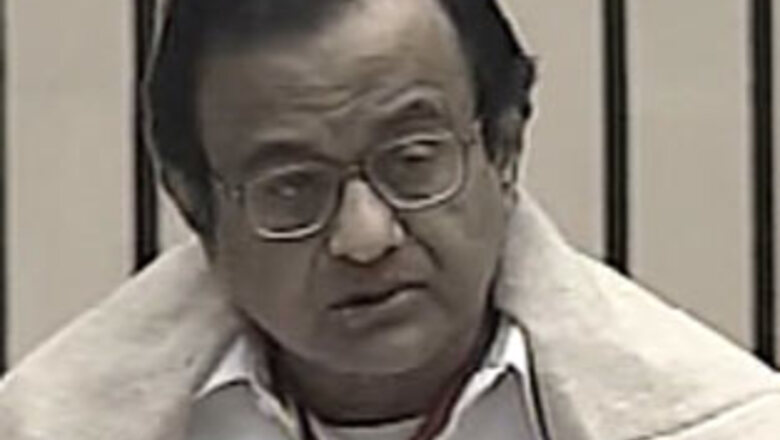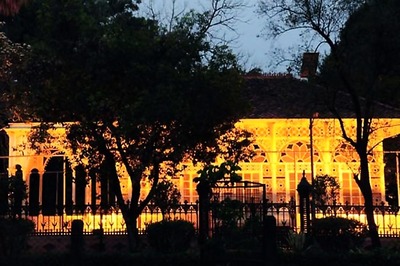
views
New Delhi: India on Sunday described Pakistan-based terrorist groups as "dark forces" which are "implacably" opposed to the country and asserted that they would be defeated whenever confronted.
Home Minister P Chidambaram said militant groups like Lashkar-e-Taiba and Hizbul Mujahideen, responsible for innumerable deadly terror strikes in India, held a meeting at
Muzaffarabad in Pakistan-occupied-Kashmir on Thursday. It was clear that these groups were "implacably" opposed to India.
"Their weapons are mayhem and violence; and their goal is forcible annexation of Kashmir. Let me make it clear that these dark forces will not succeed in their designs. We will defeat them whenever and wherever we confront them," he said in his opening statement at the Conference of Chief Ministers on Internal Security in New Delhi.
Chidambaram said there has been no significant terrorist attack and no significant communal violence in the last 14 months which was a matter of satisfaction but that did not mean that the country was not vulnerable to terror strikes.
"That, I hasten to add, does not mean that there has been no violence or that we are not vulnerable to terrorist attacks; or that there are no triggers for communal disturbances.
"We must remain vigilant. We must continue the work on enhancing capacity. And we must reform our institutions and systems of governance in order to pre-empt terrorist threats and prevent communal discord," he said.
Thanking Bangladesh for its cooperation, Chidambaram said many leaders of Northeast insurgent groups based there were forced to return to India and have either surrendered before or have been apprehended by the security forces.
"Our determined effort to curb insurgency and violence has had a salutary effect and many insurgent groups have laid down arms and come forward to hold talks with the state government concerned and the Central government," he said.
Describing Naxalism as a grave threat, the Home Minister said the Centre had announced that it would encourage state governments to talk to Naxalites if they abjured violence but the offer was scoffed at and spurned by the CPI (Maoist).
"Hence, in consultation with the Chief Ministers of Naxal-affected states, we decided to boldly confront the challenge thrown by the CPI (Maoist)," he said.
Chidambaram said there was a rise in the number of deaths in 2009 amongst civilians (591), security forces (317) and militants (217) in Naxal-affected states.
"As the security forces move forward to reclaim areas that are now dominated by the Naxalites, it is possible that this trend will continue in 2010 too. However, I am confident
that the state governments concerned will gradually gain the upper hand and re-establish the authority of the civil administration," he said.
The Home Minister, however, urged the state governments to ensure that re-establishment of the civil administration is quickly followed by implementation of development and welfare schemes.
The Home Minister said in 2009, Jammu and Kashmir and the North-eastern states witnessed the lowest level of incidents and casualties in many years. In Jammu and Kashmir, there were 499 incidents while 78 civilians and 64 members of the security forces were killed and 239 terrorists or militants were neutralised.
"However, since the beginning of this year, there has been an increase in the number of attempts to infiltrate militants into India and in the number of encounters on our
side of the border. So far, 16 militants have been killed and 16 more arrested," he said.
PAGE_BREAK
Referring to the acute problem of manpower in state police forces, Chidambaram said there was humongous vacancies in the sanctioned posts. As on January 1, 2009, there were 1,53,428 vacancies which was expected to dip to 1,38,559 on March 31 this year.
"In addition, there is Uttar Pradesh where there is a peculiar situation. In December 2008, Uttar Pradesh had sanctioned 2,04,021 new posts and I am informed that the
process of recruitment is underway. The vacancy position reflects a very unsatisfactory state of affairs.
"There is no reason why the states should not press the accelerator on recruitment and fill the vacancies. In July 2009, we had commended to the states a new, transparent,
technology-driven procedure for recruitment. Only a few states have adopted or indicated willingness to adopt the new procedure," he said.
Chidambaram said it was universally acknowledged that in matters concerning security there was no substitute for "putting more men and women on the street".
"That is why I urge you to quicken the pace of recruitment to the police force in your state. But even as you add more personnel, some of them must be dedicated to
specialised functions such as intelligence, anti-terrorist unit, quick response teams, industrial security force and coastal security."
The Home Minister said based on the responses to the questionnaire, sent by the Home Ministry to all states seeking information under 15 heads, it was found that only nine states and Union Territories have a separate cadre for intelligence and only 16 states or UTs have accepted the scheme suggested by the Intelligence Bureau to restructure the State Special Branch.
"While nearly all states have set up QRTs, six states have not yet set up an anti-terrorist unit," he said.
Chidambaram said between January 1, 2009 and September 30, 2009, only 139 rural police stations and 34 urban police stations were added. A further 282 rural police stations and 44 urban police stations are expected to be added by March 31.
While this is slow progress, the average number of personnel sanctioned for a police station is unsatisfactory.
The sanctioned average for all states and UTs is about 52 per police station. In rural police stations, the number varies from 12 in Madhya Pradesh and 13 in Orissa to 50 in Maharashtra, 51 in Gujarat, 54 in Punjab and 89 in Uttar Pradesh.
"However, this is only the sanctioned average. Adjusted for the number of vacancies, the actual strength is much lower," Chidambaram said.



















Comments
0 comment